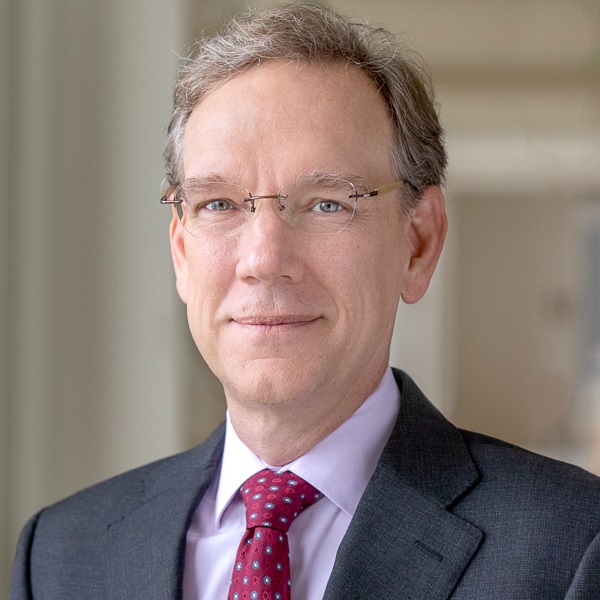Capital IdeasTM
Investment insights from Capital Group
Active Management
The world has changed.
We are living through a pivotal time in history, marked by geopolitical realignment, high inflation, volatile financial markets and the end of a 40-year period of declining interest rates. The title of this new era could be Brave New World or Back to the Future. But the title I would select is Revenge of the Boomers, because a lot of these events are rhyming with the past, particularly the early 1960s. That’s when we saw interest rates bottom out after decades of decline, as well as the rise of the Cold War era, which is unfortunately rearing its head again in some respects.
Despite these challenges, I remain optimistic about the investing environment for several reasons. First, there are still signs of growth as the global economy recovers from the pandemic. Second, I believe corporate earnings will be the driving force of equity markets going forward, as opposed to multiple expansion — a welcome return to fundamentals. And third, I think we will experience a healthy recession in the next year or two. For all the concerns about it, I see a moderate recession as necessary to clean out the excesses of the past decade. You can’t have such a sustained period of growth without an occasional downturn to balance things out. It’s normal. It’s expected. It’s healthy.
What does this mean for investors? Maintaining a balanced, “all-weather” portfolio makes sense in any environment, but particularly this one. Earlier this year, I reminded investors to keep an eye on valuations and prepare for a market correction. I remarked that I was buying a raincoat, but not putting it on yet. Turns out, it’s nice to have that raincoat nearby. Market volatility has returned, but that’s no reason to be discouraged. At Capital Group, we remain confident that we have the right people in place making decisions based on deep, company-specific fundamental research, which has always formed the basis of our long-term investment approach.
Indeed, the world has changed, but change creates opportunity.
Late cycle is a time for all-weather investing

Powerful trends have transported the world’s major economies back to where they stood just before the pandemic: firmly in late-cycle territory.
In Europe, a strengthening recovery has been stifled by the war in Ukraine. Even as the war reduces growth, it is fuelling inflation. And in China, a resurgence of COVID and lockdown policies are eroding growth in that economy.
In the US, tight labour markets are magnifying mounting wage pressures, inflation is soaring and the Federal Reserve is tightening policy. And with supply chain disruptions lingering and costs rising, corporate profit growth has been slowing. Indeed, the US economy contracted 1.5% in the first quarter.
Are we headed for recession? The risk is clearly rising, says US economist Jared Franz, but much will depend on labour markets and the Fed’s resolve to aggressively reduce inflationary pressures.
“Late cycles are not predictive of recessions, but they do tell you that the economy’s ability to bounce back from shocks is reduced,” Franz says. “The environment is changing rapidly and significant headwinds have emerged. I view this as a time to pursue all-weather portfolios built to withstand a variety of risks.”
Sources: Capital Group, FactSet. GDP data are in USD and are the latest available as at 31/3/2022. Country position within the business cycle are forward-looking estimates by Capital Group economists as at June 2022, shown for illustrative purposes only.
Risk factors you should consider before investing:
- This material is not intended to provide investment advice or be considered a personal recommendation.
- The value of investments and income from them can go down as well as up and you may lose some or all of your initial investment.
- Past results are not a guide to future results.
- If the currency in which you invest strengthens against the currency in which the underlying investments of the fund are made, the value of your investment will decrease. Currency hedging seeks to limit this, but there is no guarantee that hedging will be totally successful.
- Depending on the strategy, risks may be associated with investing in fixed income, emerging markets and/or high-yield securities; emerging markets are volatile and may suffer from liquidity problems.
Our latest insights
Past results are not predictive of results in future periods. It is not possible to invest directly in an index, which is unmanaged. The value of investments and income from them can go down as well as up and you may lose some or all of your initial investment. This information is not intended to provide investment, tax or other advice, or to be a solicitation to buy or sell any securities.
Statements attributed to an individual represent the opinions of that individual as of the date published and do not necessarily reflect the opinions of Capital Group or its affiliates. All information is as at the date indicated unless otherwise stated. Some information may have been obtained from third parties, and as such the reliability of that information is not guaranteed.
Capital Group manages equity assets through three investment groups. These groups make investment and proxy voting decisions independently. Fixed income investment professionals provide fixed income research and investment management across the Capital organization; however, for securities with equity characteristics, they act solely on behalf of one of the three equity investment groups.
 Rob Lovelace
Rob Lovelace